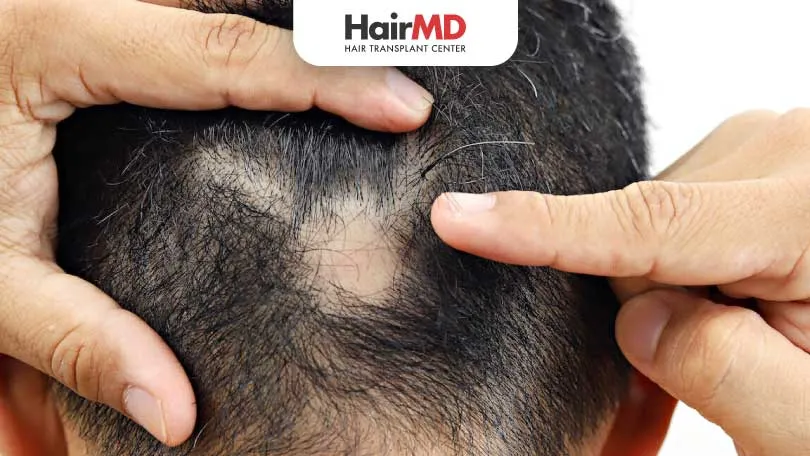29th May, 2024

Alopecia Universalis refers to a condition in which there is a complete loss of hair from the scalp and the body. Many times, the condition starts with alopecia areata causing bald patches that occur suddenly and it progresses to alopecia Universalis, leaving no hair on the body. All body hair which includes the eyebrows, eyelashes, chest, and other body parts, is lost in alopecia Universalis. It is the most severe form of alopecia areata. While some individuals may see hair regrowth after a few months or years, others may experience permanent, irreversible hair loss.
Individuals with alopecia Universalis are otherwise healthy and their condition is neither painful nor contagious. However, living with this hair condition can be difficult as it affects one’s overall appearance and increases the risk of some health conditions that may arise due to the lack of hair on the scalp and body.
Due to total baldness, there is an increased risk of scalp burn from sun exposure. Due to the absence of eyebrows and eyelashes, it is easier for impurities to get into the eyes. Similarly, due to the lack of hair inside the nose, it gets easier for bacteria or germs to enter the nose, which increases the risk of respiratory diseases. Due to a different appearance caused by total hair loss from the body, the affected individual may have low self-esteem and experience anxiety and depression.
What’s covered in the article?
- Alopecia Universalis Causes
- Alopecia Universalis Treatment
- Conclusion
Alopecia Universalis Causes
- Alopecia Universalis is an autoimmune disorder, in which the immune system attacks the hair follicles.
- This hair condition is also linked with one’s genetic makeup which is evident from the fact that those with a family history of alopecia Universalis have a higher possibility of getting the same.
- Excessive stress may trigger alopecia Universalis but there is no conclusive research to support this.
- Alopecia Universalis may also be caused by thyroid disorders, vitiligo, psoriasis, diabetes mellitus, Down’s syndrome, Addison’s disease, and some autoimmune conditions.
Alopecia Universalis Treatment
- Corticosteroids may be prescribed to suppress the immune system.
- Topical immunotherapy is a treatment aimed at stimulating the immune system and directing its response away from the hair follicles, thereby promoting hair growth.
- Cryotherapy is another effective treatment for alopecia universalis.
- Injecting steroids in localized bald patches can help treat hair loss caused by alopecia universalis.
- Topical diphencyprone causes an allergic reaction to trigger an immune system response and also helps activate the hair follicles to boost the growth of hair.
- An immunosuppressive drug called cyclosporine, combined with a certain steroid can work well to treat alopecia universalis.
- UV light therapy is another good treatment that reduces inflammation and activates the hair follicles thus promoting hair growth.
- PRP therapy can be used in treating alopecia universalis as it helps provide the growth factor to the hair follicles.
- An NRE drug like Tofacitinib can also be given as a treatment for alopecia Universalis.
- Treatment methods advised for alopecia areata may also work for alopecia Universalis by helping in hair regrowth on the scalp or other parts of the body.
- Remember that all these treatments require the guidelines and consultation of a dermatologist, so as to prevent any side effects.
The most correct answer to ‘What is the best treatment for alopecia Universalis?’ can be given only by an expert in the field. So those seeking treatment for this hair condition must consult a dermatologist. One of the best places to approach to get treated for alopecia Universalis or any other hair condition, is HairMD, a recognized hair transplant centre in Pune. It has a team of experienced dermatologists who specialize in hair treatments. They will diagnose your hair condition and administer the treatment that suits you best. The excellent services and expert medical guidance at HairMD will help you attain healthy and beautiful hair.
Do You Know?
Nearly 250 Patients Visit HairMD
Everyday For Various Hair Concerns?
(You are one click away from flawless skin)
Meet Our Dermatologists
Conclusion
Alopecia Universalis, a severe form of hair loss, can be challenging to treat, but advancements in medical science have opened up several options for managing the condition. Treatments such as immunotherapy, corticosteroids, and JAK inhibitors show promise in promoting hair regrowth, although results may vary from person to person. Since Alopecia Universalis is an autoimmune disorder, it’s essential to work closely with a dermatologist or specialist to explore the most effective treatment plan tailored to your needs. Early intervention and consistent care can significantly improve outcomes and help manage this complex condition.
Further Reading
Hair Loss – Could It Be a Sign of a Bigger Health Problem?
Find effective hair regrowth treatments for women. Explore solutions like PRP, medications, and more to combat hair loss with expert advice from HairMD.
Do Hats or Helmets Cause Hair Loss?
Discover the truth about Helmets Cause Hair Loss. Learn how improper helmet use & effective tips to maintain healthy hair with HairMD can affect hair health.
Top Hair Growth Treatments for Women: Your Ultimate Guide
Find effective hair regrowth treatments for women. Explore solutions like PRP, medications, and more to combat hair loss with expert advice from HairMD.
Itchy Scalp and Hair Loss: Causes, Treatments, and Prevention
Itchy scalp and hair loss can be troubling, hinting at deeper scalp and hair health issues. Discover the connection in this comprehensive guide.
Have thoughts? Please let us know
We are committed not only to treating you, but also educating you.











